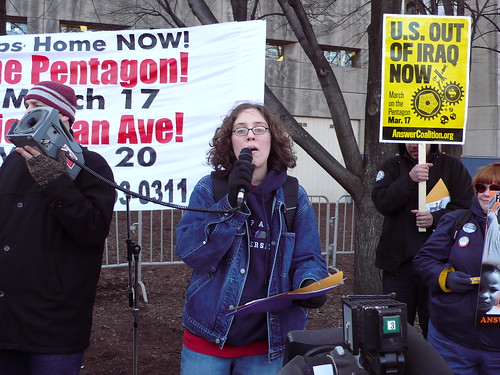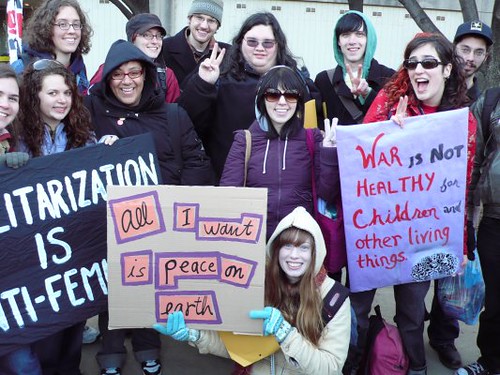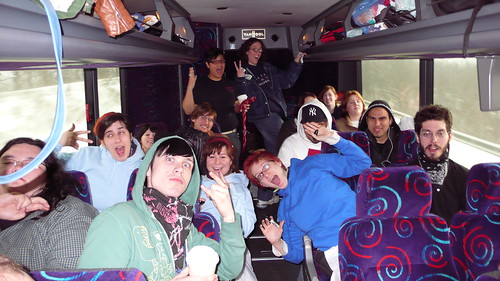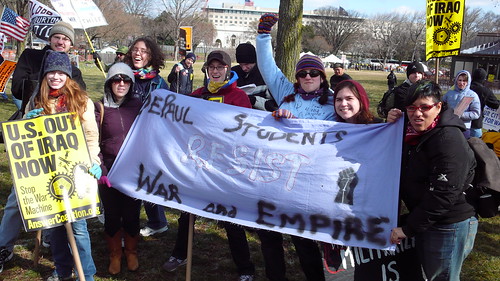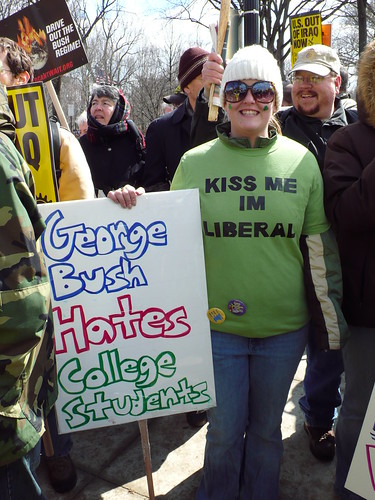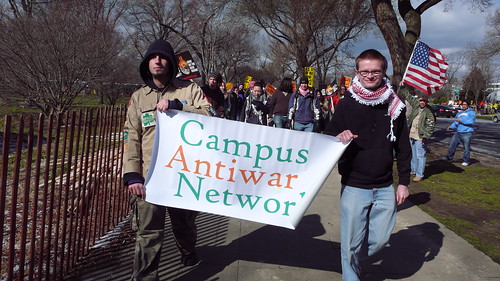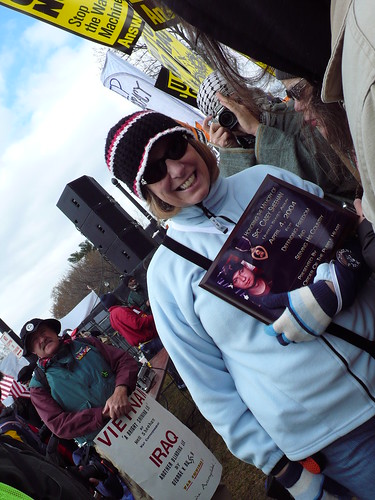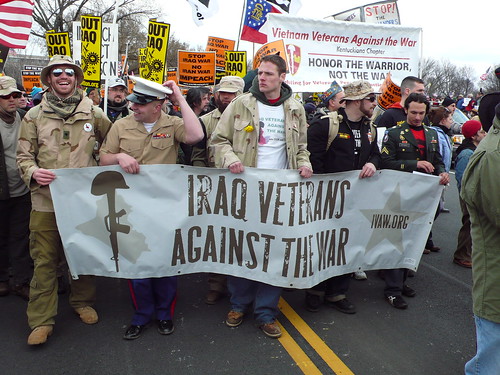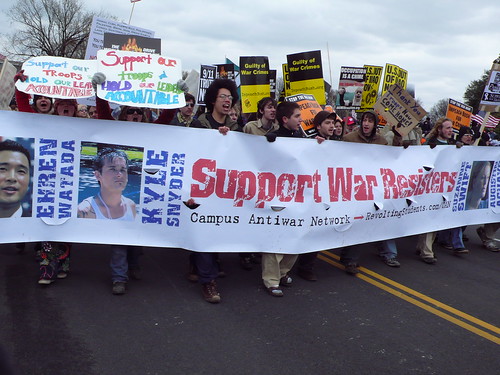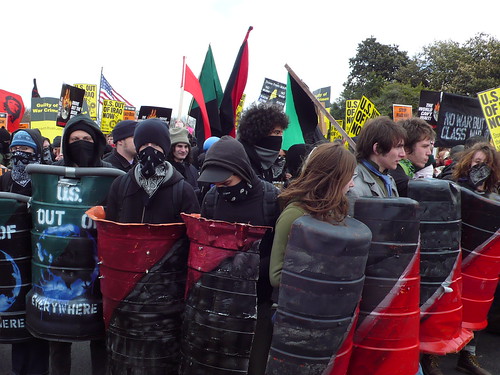The ANSWER coalition sponsored a large march on the Pentagon on the 4th anniversary of the US invasion of Iraq and the 40th anniversary of the 1967 SDS march on the Pentagon. Organizers estimated the DC mobilization at 25,000 (would have been larger but bad weather in the North East blocked many buses and airplane flights) and the LA mobilization the same day at 50,000.
Chicago resident should come out on March 20th 2007, the actual anniversary of the Iraq war, to march on Michigan ave. http://www.m20coalition.net/ for more info.
I traveled to DC on the buses from ANSWER with 12 other members of DePaul Students Against the War (DSAW) who were able to get school funding for the bus trip.
DSAW member Megan Miskiewicz spoke at the ANSWER send off rally at the Art Institute of Chicago.
Hatim Abudyah speaks at the send off rally.
DSAW poses at the take off rally.
At the send-off rally, a number of media covered the event. My favorite, was Al-Jazeera. They even came on the bus and rode with us for a bit, documenting people's reasons for going. I tried to get them to interview some of the other DePaul students, but they ended up interviewing me. They asked me if I thought the Democrats would end the war, to which I explained that all the democrats proposals for ending the war rely on establishing a puppet regime in Iraq. They want to end the war, by winning it. He asked me about what happens if the US pulls out of Iraq right away, would violence and the sectarian war expand? I replied that we have to remember first of all that there is already violence in Iraq, so it's not like the US is preventing any violence. I continued that if anything, the US leaving would decrease violence and the threat of violence, as there would be less of a threat of a war with Iran, and the US wouldn't be killing people in Iraq anymore. With that we ended the brief interview. I just wish I mentioned that the US needed to end the war in Afghanistan (remember that war?) and to stop funding Israel's occupation of Palestine. Next time.
DSAW on the bus to DC
The sun rising after a night of riding the bus.
The ride there was fun. We had a bunch of good movies on our bus that we watched. Sir, no sir- a movie about Vietnam war era servicemen and servicewomen who resisted the war machine. The Corporation- about how powerful and evil corporations are. Where We Stood- a documentary about Chicago's response to the start of the war against Iraq (we seized Lake Shore Drive!) On the way back we watched Harlan County USA (a documentary about a mine strike).
There were quite a few right-wingers there to protest us. I was told that they got their funding from the same people who did the "Swift Boat Vets for Truth." They were able to turn out a lot of people because of the absolutely outrageous lie that anti-war demonstrators were going to spray-paint or otherwise desecrate the Vietnam war memorial. Most of them were vets/bikers. They flew a lot of American flags, one even flew the South Vietnam flag.
One ANSWER organizer spoke about the struggle just to have the rally. The Pentagon wanted to charge us to use their parking lot for the protest. In the end the Pentagon wanted 6 grand. The organizers did the math and worked out that it would be spending for about 2.3 seconds of the Iraq war. They refused to pay a single cent because they want the troops home NOW, not 2.3 seconds from now!
DSAW after arriving at the rally in DC.
It was St. Patricks day and I liked this girls shirt.
Campus Antiwar Network members at the rally.
Cindy Sheehan was one of the speakers at the rally.
Once the march got started, it was veterans and their families that led the march on the Pentagon.
Behind them were members of the newly reformed Students for a Democratic Society. As the march neared the Pentagon, SDS members tried to cross a bridge to get closer to the Pentagon, but were stopped by riot police. I'm told a flare was set off by the police and that there were 1-3 arrests. I can't confirm that though.
The stand off between SDS members and the riot police was comical. I lost track of how many times people voted to stand up or sit down. One person would shout to move back a few feet while another would shout to move a few feet up. I know a lot of the most militant members of the movement are Anarchists, but that doesn't mean that we can't vote for temporary leaders on the battlefront to prevent confusion, and more importantly, prevent undercover police from influencing the decisions of the militant factions. But there is the other problem, what could 3 dozen kids with practically no militant training expect to do with plastic shields against riot police. That's not even taking into consideration what would happen if they actually managed to make it to the Pentagon. I appreciate the sentiment, but maybe militant splinters from large demo's aren't the best way to cause serious damage to the Empire?
When the rally and march were over, we had some free time before we had to catch our buses, so a few friends and I wandered around DC. We took some pictures at the Lincoln Memorial. I saw the plaque that was placed at the spot Dr. Martin Luther King Jr. gave his "I have a dream" speech. I was disappointed at the lack of maintenance it had received, compared to the rest of the monument. It was dusty and cracked, I wondered if they intentionally wanted to spite this historic spot for Black history.
We also passed the Vietnam war memorial. While I still wish they would make a memorial remembering all the Vietnamese who lost their lives so that Vietnam could be independent of French and American imperialism, it is still a sobering monument, one that dips down into the ground. It was designed by a Japanese woman, and I recall a lot of right-wingers took offense to, god forbid, having an Asian woman design an American monument. At the entrances to the monument though, were more of the asshole bikers. As we were leaving, one protester carrying a sign, tried to walk into the memorial. These goons started shouting at him and called the cops on him, like they were in kindergarten and needed the teacher or something. I tried to defend this kid, telling them, he wasn't doing anything wrong, he just wanted to look at the monument. They came back with all this crap about it being a non-political space. WHAT? So the monument to a political war, is supposed to be non-political? Bullshit!
On the bus ride home, the microphone for the bus was opened up for people to speak about their views on what happened, what moved them, etc. I went up and spoke about something that struck me. When we came towards the end of the march, I saw the Pentagon just across the highway. It was a sobering moment. Realizing all the lives that those who work in that building have ruined. The maimed, the crippled, the dead. The families left to carry on. But it was disappointing in a sense because you almost expected evil organ music to play while lighting and thunder crashed and the skies rained blood around the Pentagon. Instead it was just a boring office building. Which I think highlights what Hannah Arendt talked about in Eichmann in Jerusalem. It's the banality of evil. Eichmann was just a paper pusher, he had a desk job, it's just that his desk job was drawing up the plans to execute the Nazi Holocaust. Likewise those who work at the Pentagon (excluding janitors, cooks, other low wage workers) are drawing up plans to destroy lives around the world.
On to the next protest!

